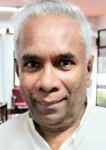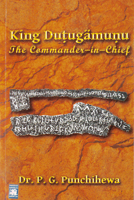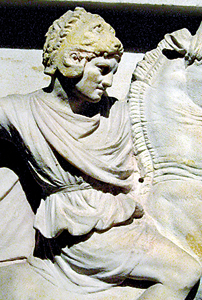A well-researched work on a national hero
“This persevering, indefatigable, energetic, warlike and religious prince, beloved by his people, honoured by his contemporaries and extolled by posterity, as the deliverer of his country, the embellisher of Ceylon and the prop and supporter of Buddhism itself.”
This is how British historian William Knighton described King Dutugamunu (he calls him ‘Gaimono’) in his book, ‘History of Ceylon’ (1845). Having picked up this book on the pavement in Buddha Gaya, Dr. P. G. Punchihewa was inspired to go deep into the history of his childhood hero, Dutugamunu. Last week he launched ‘King Dutugamunu – The Commander-in-Chief’ amidst a gathering of academics, former administrators (he himself was a member of the now defunct Ceylon Civil Service) and Peradeniya campus colleagues.

P.G. Punchihewa
The historical chronicle, the Mahavamsa figured prominently at the launch presided over by Professor K. N. O. Dharmadasa with speeches being made by diplomat/historian Bandu Silva and former History Professor W. I. Siriweera. The Mahavamsa has devoted 11 of 37 chapters to describe the life and work of Dutugamunu. The author quotes extensively from the Mahavamsa as well as other sources including more recent ones.
In his introduction to the book, author Punchihewa mentions that although Dutugamunu lived for 68 years, his reign lasted only 24 years (161-137 BC). “In spite of this short period, there is no other personality in the history of this island who commands such reverence, adulation and homage, from royalty, nobility and commonality, for a period of over two millennia,” he states.
Devoting the first two chapters to Dutugamunu’s father and mother, King Kavantissa and Viharamahadevi, Punchihewa then discusses the fascinating story of the 10 warriors – the generals of the Rohana army whose contributions to achieve Dutugamunu’s objectives were enormous.
Kandula, the royal elephant has also been given its due place. After describing the five qualities that a royal elephant possesses – “It is attentive, it destroys, it protects, it bears up, it goes” – as mentioned in the Tripitaka (Anguttara Nikaya) – Punchihewa quotes Professor Merlin Peris from the latter’s highly researched work on Kandula: “Of the many elephants that for one reason or another, had attracted public attention in the long history of Sri Lanka, no more than three are remembered today, two of them being of recent times. One of these is the formidable pachyderm celebrated in song, whose assault, the stockade of the Panamure kraal of 1944 could hardly withstand.
The other, Raja is famed for the singular majesty with which he bore the casket of the Sacred Tooth Relic year after year, for well-nigh 40 years at Kandy’s Esala Perahara….a service which won him the love of the people. Yet there is no elephant whose little enough evidence deserved that much more study for his being the greatest of his kind in history. For, from what the chronicles reveal, even if grudgingly there appears to have been no other in the class of battle elephants anywhere in the world that had displayed such patriotism, courage, pugnacity and endurance as Kandula in his royal master Dutugamunu’s campaign to liberate the island from Damila rule.”
Elara – the longest rule
Punchihewa devotes seven chapters to relate the story of Dutugamunu’s efforts to make Sri Lanka a unified country. Referring to King Elara, he points out that Elara’s actions, notwithstanding his observance of justice, may have been a measure to win over the Sinhalese.
After all, he ruled for 44 years – the longest in history. Punchihewa comments: To survive for such a long period in a foreign country, the ruler should be extremely popular and/or have a strong army to back him. He had adopted both these measures….Elara had a powerful army…. The time Dutugamunu marched against him, Elara had a string of fortresses south of Anuradhapura extending up to Mahiyangana….In addition to the Tamil generals, there were Sinhalese generals as well who served him…Although Elara was a just ruler, his Tamil followers were not so.
Referring to the two objectives in Dutugamunu’s life – to unify the country under one banner by eliminating the alien forces and to establish the Sasana which had suffered at the hands of the foreigner – Punchihewa describes in detail his activities relating to both with concrete evidence.
A multifaceted gem
Comparing the life and character of Dutugamunu to a multifaceted gem, Punchihewa says that it is hard to find such a ruler from world history. The closest is Emperor Asoka. Many are the similarities but he sees a main difference in the objectives of the two. In the case of Asoka, the objective was ‘digvijaya’, conquest of land. But Dutugamunu’s, from childhood, was the establishment of the Sambuddha doctrine and unification of the country.

Calling Dutugamunu’s war with Elara the first professionally waged war recorded in Sri Lankan history, Punchihewa says that this was against the background that Dutugamunu had no access to any knowledge of military affairs, with no major war involving him. But the skills he displayed and the tactics he adopted before and during the war were those of an experienced military leader. These he explains in detail.
This well-researched book has been written in a most readable fashion and divided into short chapters, each devoted to a single, clear-cut topic. Relevant appendices make it easy for the reader to go into more detail using the references. The Stamford Lake Publication is a neat presentation.
“A grateful nation even after two millennia remembers him as its national hero. Neither Sri Lanka nor the world could boast of any other ruler who was endowed with such sterling qualities,” Punchihewa concludes.
Follow @timesonlinelk
comments powered by Disqus




















